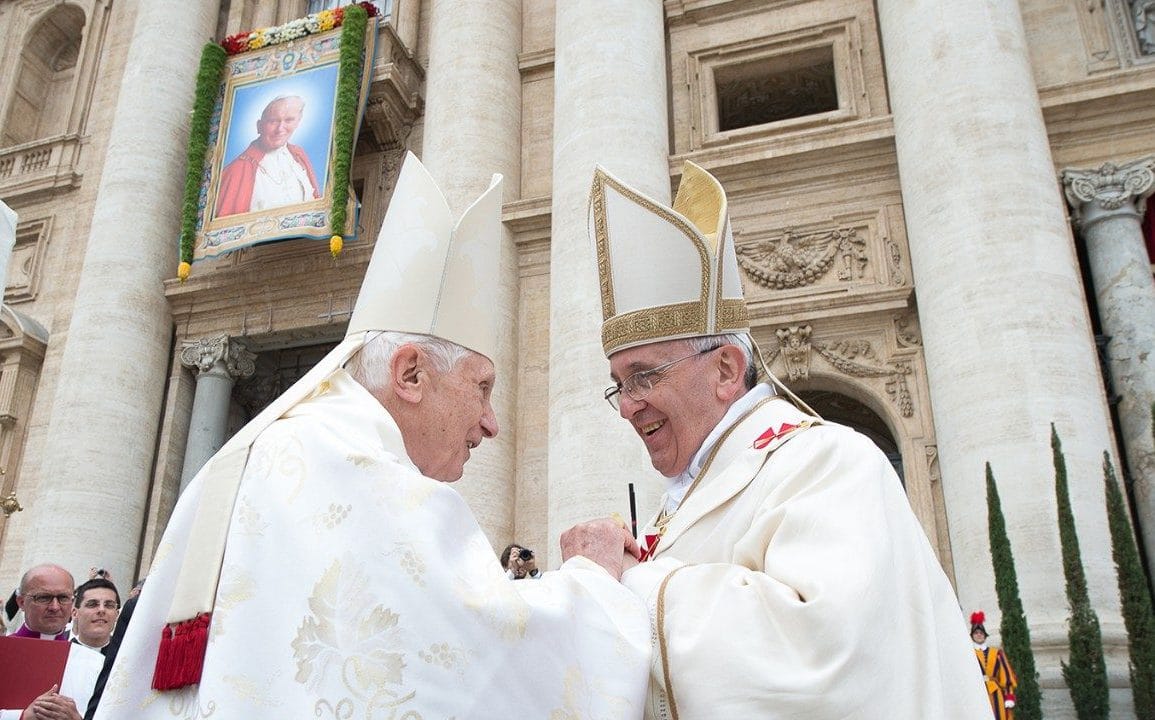Today, February 11, 2022, marks the 9th anniversary of Pope Emeritus Benedict XVI’s renunciation.
Pope Joseph Ratzinger announced his renunciation on February 11, 2013: “I have arrived at the certainty that, because of my advanced age, I no longer have the strength to exercise adequately the Petrine Ministry.” Thus, Benedict XVI became the first Pontiff, in almost 600 years, to renounce his office as Successor of Peter.
He pronounced his last words as Bishop of Rome the following February 28, before the faithful of the diocese of Albano, gathered in Castel Gandolfo. “You know that for me this is a different day from the previous ones. I am no longer Supreme Pontiff of the Catholic Church. I shall still be so until 8 o’clock this evening, afterward no longer. I am simply a pilgrim who begins the last stage of his pilgrimage on this earth. However, I would still like to work with my heart, with my love, with my prayer, with my reflection, with all my inner strength for the common good and the good of the Church and of humanity. And I feel very supported by your affection. Let us walk together to the Lord for the good of the Church and of the world. Thank you (…).
“A Decision Taken Consciously”
Regarding his renunciation, in March of 2021, he said to the Corriere della Sera: “Some of my somewhat ‘fanatic’ friends continue to be angry; they have been unwilling to accept my decision. I’m thinking of the conspiracy theories that followed it: some said that it was because of the Vatileaks’ scandal, others because it was a plot of the gay lobby, others that it was because of the case of the Lefebvrist conservative theologian Richard Williamson,” explained the Pope Emeritus.
“They don’t want to believe in a decision taken consciously. But my conscience is at peace,” he concluded on the matter.
Pope Francis’ First Words About the Pope Emeritus
The white smoke on March 13, 2013, announced the arrival of the new Holy Father, Pope Francis. “Thank you. And, first of all, I would like to pray for our Bishop Emeritus, Benedict XVI. Let us all pray together for him, may the Lord bless him and the Virgin protect him,” said Pope Francis in his first greeting as Successor of Peter.
Likewise, at the beginning of the homily in the Mass, on March 19, 2013, at the start of his pontificate, his first words were for the now Pope Emeritus: “I thank the Lord for being able to celebrate this Holy Mass at the start of the Petrine ministry on the Solemnity of Saint Joseph, husband of the Virgin Mary and Patron of the universal Church: it’s a coincidence rich in meaning, and it’s also the Name Day of my venerated Predecessor: we are close to you in prayer, full of affection and gratitude,” he said.
His Life in the Mater Ecclesiae Monastery
Since his renunciation, Benedict XVI has lived in the Mater Ecclesiae Monastery in the Vatican, a few meters from Pope Francis’ residence, in Casa Santa Marta.
As can be observed on the social networks of the Joseph Ratzinger-Benedict XVI Foundation, the previous Pontiff continues to hold private meetings, to read and to write books. In the first years as Pope Emeritus, he made some public appearances, including the canonization of John XXIII and John Paul II, one of the most endearing. However, with the passing of the years and due to his advanced age, these meetings have been increasingly fewer.
He did take part in several Consistories for the creation of Cardinals, the first on February 22, 2014. When his health conditions ruled out his participation in them, new Cardinals began to visit the Pope Emeritus together with Pope Francis.
In the last of these meetings, on November 28, 2020, Pope Ratzinger confided to the new Cardinals: “The Lord took away my use of the speech to make me appreciate silence.”
Benedict XVI’s “Confession”
This very week, Pope Emeritus Benedict XVI intervened personally to express his opinion on the Report of Abuses in the Archdiocese of Munich and Freising, Germany, where he was Archbishop for less than five years.
In a letter, he clarifies the error related to his statement, making a personal “confession”: expressing his shame and sorrow, manifesting his closeness to the victims, and asking for pardon again.
Both in the analysis made by the Pope Emeritus’ collaborators, as well as in the interview with Dr. Hesemann, offered by Exaudi, the response is made to the accusations leveled against the then Cardinal Ratzinger, dismantling them point by point.
In regard to this matter, Benedict said: “I was profoundly affected by the fact that the negligence was used to doubt my truthfulness, and to even present me as a liar,” although I have also been more moved by the numerous expressions of trust, cordial testimonies and moving letters of encouragement that I have received from many people.” And, he said he was “especially grateful to Pope Francis for his trust, support, and prayer, which he expressed to me personally.”
Thank you, Pope Emeritus Benedict XVI! Through our prayers, receive our affection and support.
Translation by Virginia M. Forrester









